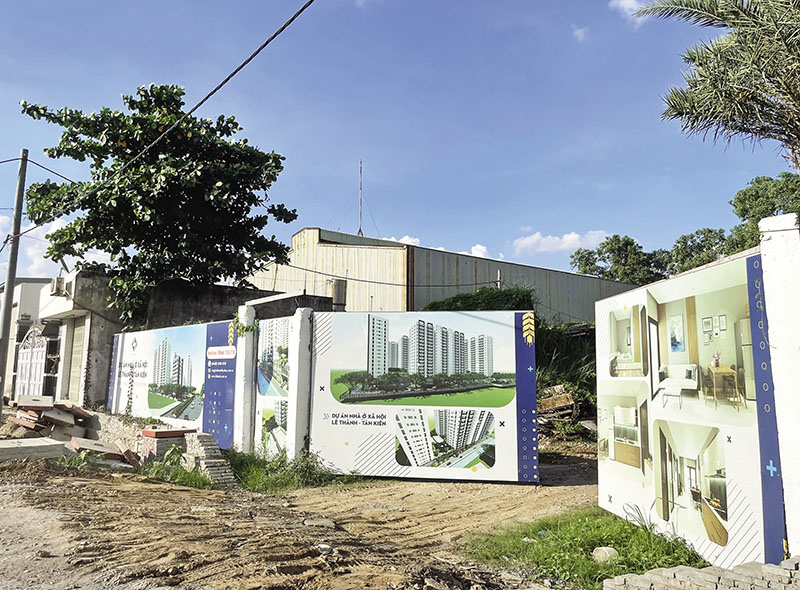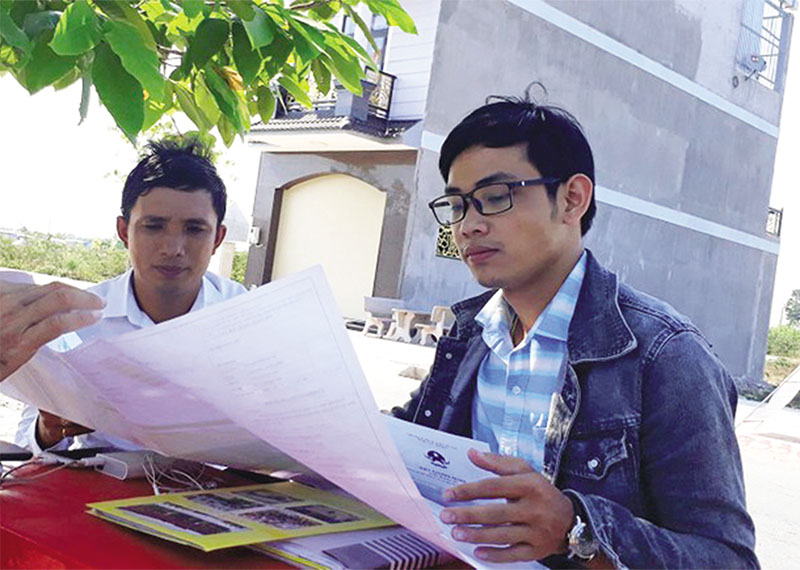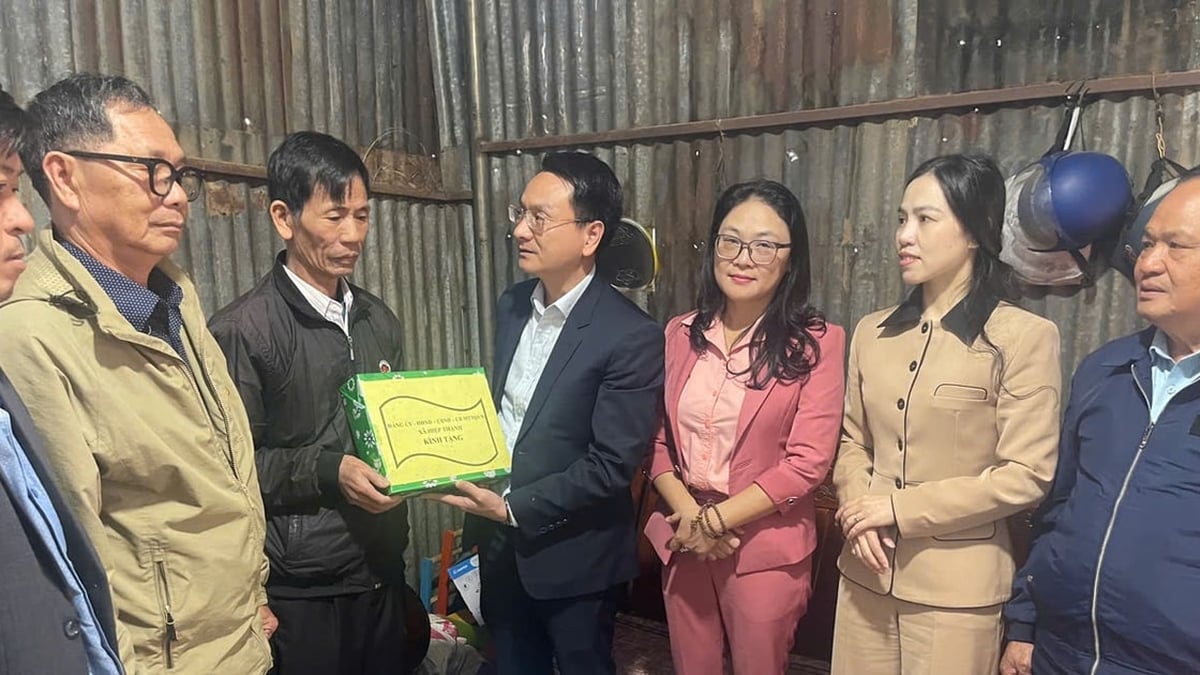When real estate businesses encounter difficulties, journalists also worry, sympathize, accompany, support businesses to reflect, propose wishes, and make recommendations to remove obstacles...
 |
| The complicated process and procedures for investing in the construction of social housing projects are the reason why Le Thanh Company's Le Thanh - Tan Kien Project has been "frozen" for many years. |
1.
Mr. Le Huu Nghia, General Director of Le Thanh Company - a company specializing in developing social housing in Ho Chi Minh City - has repeatedly "refused" to answer my interviews about issues surrounding the development of social housing, a very "hot" topic today. It is not because Mr. Nghia is reserved or afraid to appear in the press, but because he has made too many recommendations, but the situation has not yet made much progress.
According to current regulations, social housing projects are given incentives to increase construction density and land use coefficient by 1.5 times compared to commercial housing. However, many social housing projects are converted from commercial housing projects, so they are not suitable for planning. To be suitable for incentives, the 1/2,000 and 1/500 planning must be adjusted. However, adjusting the planning is extremely difficult.
Investors who want to build social housing projects must carry out procedures related to determining land prices, land use fees, and land rent to apply for exemption from these fees. This is a point that has caused many investors to get stuck for a long time, because the procedures for requesting exemption from land rent and land use fees often take a long time. That is also the reason why Le Thanh Company's project has been "frozen" for many years.
Sometimes, on my way to work, passing by the social housing project in Binh Chanh district that Le Thanh Company is building, looking at the silent construction site, behind high walls, I can't help but feel sad.
It is a pity that the Government is promoting the goal of building at least 1 million social housing units in the 2021 - 2030 period, but the lack of social housing supply is still a hot topic that the press is exploiting, while there are countless projects with unresolved problems such as the project of Le Thanh Company.
Attending the dialogue sessions between businesses and local authorities, we were also secretly happy, because the business projects with specific problems were "named and shamed" by the government leaders, anxiously waiting for the problems to be resolved, then... frustrated with the businesses, because after so many years, the project still had no progress.
Of course, the press and businesses also clearly see the efforts and determination of local authorities in completely removing obstacles, but it is also difficult to understand that when the documents reach the specialized agencies, they are... stuck.
These problems have been continuously mentioned by Dau Tu Newspaper and many other press agencies, through articles, reports, comments... Many seminars and talks have also been organized to discuss solutions. The good news is that voices from practice have been recognized by ministries and branches. Problems related to land, real estate market, housing projects... are gradually being solved through the promulgation of new laws (Land Law, Real Estate Business Law, Housing Law) and soon to be guided decrees.
Recently, meeting Mr. Nghia again at a real estate event, I interviewed him with the same old question, but this time, he was very excited that the newly issued policies have reduced many procedures for businesses. For example, the Housing Law 2023 stipulates that procedures for determining prices, land use fees and land rents are exempted from the beginning. "That is a very important point, helping to remove obstacles for investors," Mr. Nghia said.
 |
| Investment Newspaper reporter (right) seeks information, listens to real estate business representatives share about difficulties and recommendations to remove obstacles for the project |
2.
After two years of being affected by the Covid-19 pandemic, followed by capital crises, the real estate market has gradually warmed up following policy movements from the Government and drastic decisions in the parliament. The Government has taken specific and timely measures to support businesses, from preferential tax policies to financial support packages and measures to promote consumption.
However, changes at the grassroots level are still slow. There are mechanisms and policies that have been approved, but when implemented, they encounter many obstacles. There are legal documents that are still quite "cumbersome", lacking practicality, and not meeting the needs of businesses and the market in a timely manner. Therefore, businesses are at risk of falling into a vicious cycle: waiting for old projects to be resolved, finding new projects to develop, and continuing to petition for resolution...
The new Land Law stipulates that projects that are not implemented or are delayed will be subject to a repossession mechanism without compensation. According to Mr. Le Huu Nghia, this is a very strict regulation to avoid speculative enterprises, but there needs to be clear guidance in the decrees so that enterprises do not "die unjustly", because there are many cases of force majeure: enterprises cannot implement projects due to slow procedures related to the authorities.
In such cases, the press needs to speak out.
Mr. Nguyen Van Dinh, Chairman of the Vietnam Real Estate Brokers Association, emphasized that in the context of strong development of information technology as today, the press is not only a channel for providing information, spreading comments, reflections, and recommendations from people, businesses, professional social organizations, etc., but also plays an extremely important role in shaping and developing the real estate market.
“In recent times, the press has supported state management agencies in the policy-making process, acting as a bridge between market players and the State,” Mr. Dinh commented.
Accordingly, the press is a channel to reflect public opinions and aspirations on mechanisms and policies related to the real estate sector, thereby influencing the Government's policy planning and adjustment. In addition, the press also organizes and coordinates seminars, conferences, and discussion forums between experts, investors and the Government on issues related to real estate, contributing to building a healthy and sustainable market; actively contributing to the completion and amendment of laws and sub-law documents related to the real estate market.
3.
Businesses, through the press, have had the opportunity to express their wishes and desires for a more favorable business environment. The press has helped those voices reach policy makers, creating positive changes.
Of course, not every business is willing to share its story with the public. Typically, businesses share a lot of information at meetings, dialogues between the government and businesses, or seminars organized by press agencies or industry associations. But “a lot” is not necessarily “enough”.
In fact, there are still some cases of harassment in the work of a few reporters, so many real estate business leaders are hesitant, even cautious, when sharing with reporters, for fear of "slipping up their tongues". They are afraid that sharing information may bring unnecessary risks, or negatively affect the image of the business...
I myself have been refused information sharing many times during my work. To be fair, only when we are close enough and have built enough trust, will businesses and business leaders be willing to share information, even “behind the scenes” stories.
Not long ago, I was very happy and a little surprised to read the news that, at the parliament, National Assembly delegate Vu Trong Kim cited information published in Dau Tu Newspaper to express his frustration with the bottlenecks in land valuation, causing many projects to stagnate. That was my article with the title: "After 29 announcements, Ho Chi Minh City still has not found a unit to value a 4,400 m2 land plot", published in Dau Tu Newspaper.
To get information for this article, every day, I have to read dozens of competitive bidding invitations posted by the Department of Natural Resources and Environment of Ho Chi Minh City. Previously, this agency had a report outlining the difficulties and proposing mechanisms to remove difficulties in land valuation activities. Reading the content of competitive bidding invitations is also a way to assess the issues raised by this agency, at the same time demonstrating the responsibility of journalists to closely follow the breath of the market.
In addition to being cited by National Assembly delegates to make recommendations, information from my article was later used by a series of press agencies to write analytical articles, not only on the problems in current regulations, but also to contribute ideas to draft decrees that are being consulted. As Mr. Tran Quoc Dung, Deputy General Director of Hung Thinh Corporation, said, this is the "sprint" time to complete policies, so the responsibility to contribute ideas is the responsibility of all people, towards a healthy and sustainable development of the real estate market.
Source: https://baodautu.vn/batdongsan/bao-chi-dan-than-cung-thi-truong-doanh-nghiep-bat-dong-san-d218153.html





































































































Comment (0)